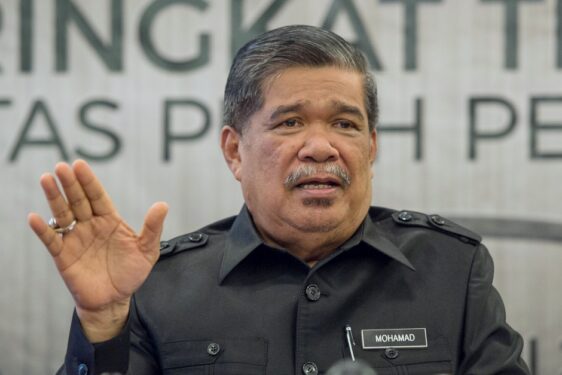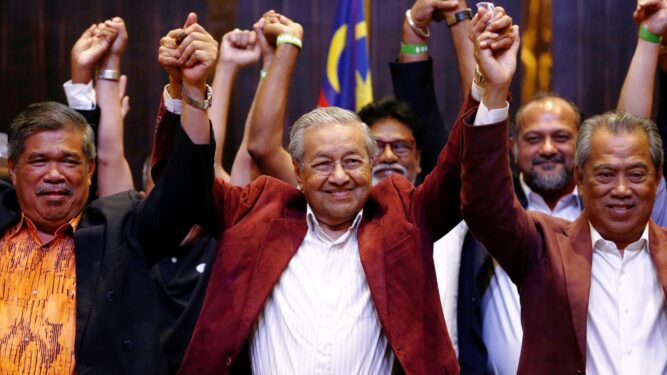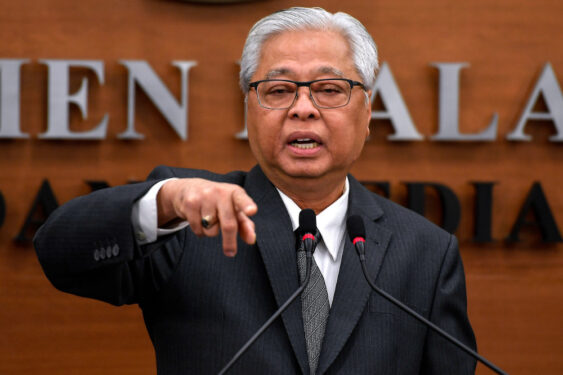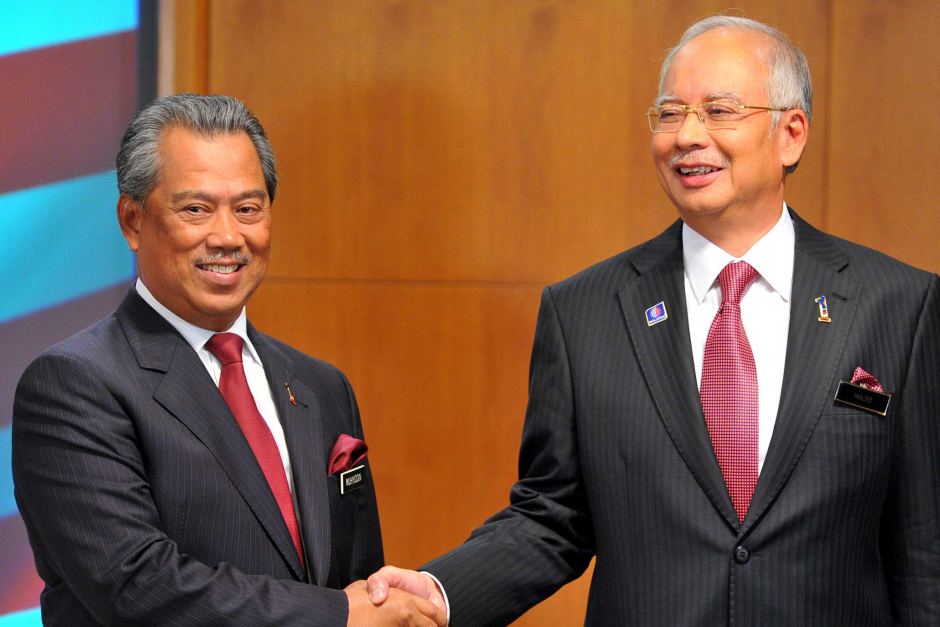TRACING back the jailing of former prime minister Datuk Seri Najib Razak to when it all started will yield better and more powerful lessons, rather than rejoicing over it with statements such as “justice has been finally served” or “this is just the beginning of the fight against corruption”.
Those are mere platitudes that would not provide any solution to a problem.
When it comes to the crunch, those who earnestly talk very passionately about corruption will be the first to admit they don’t have the solutions to today’s complex problems of fighting corruption. What they have is merely a mastery of general principles on how to go about eradicating the roots of corruption in society.
However, this is not good enough if it’s not contextualised to the unique time and space of a particular setting, for otherwise, it will become an airy-fairy thing.
If solutions are not forthcoming, then at least learn and grasp the lessons first. Hence, Amanah president Mohamad Sabu was spot on for urging Malaysians against being arrogant or overjoyed about Najib going to jail over the SRC International case.

Mohamad, better known as Mat Sabu, said Najib’s conviction should instead be a lesson for all to steer clear of emulating the former prime minister in committing small or major crimes.
“We should not be happy when something bad happens to someone,” he said in a recent Facebook post.
“Malaysians must continue looking to build the nation and eradicate corruption so that Malaysia becomes a prosperous and peaceful nation with integrity, now and in the future.
“Take every catastrophe that happens to others as a lesson for us all. Let’s not be arrogant or snobbish. Instead, let us all seek forgiveness from God,” he added.
Muhyiddin’s role
The initial catalyst that led to the jailing of Najib occurred when the second most powerful man in the country, then deputy prime minister Tan Sri Muhyiddin Yassin, broke rank with his UMNO colleagues in speaking out against the 1Malaysia Development Bhd (1MDB) shenanigan created by Najib.
Criticise him all you want as no man is perfect but it takes guts and gumption to break rank with your colleagues and, most importantly, have the courage to speak out against the most powerful man in the country — i.e. the prime minister.
This reminds me of an authentic hadith of the Prophet (peace be upon him) that says the “best jihad is to speak the truth in front of an oppressive ruler”, like what the late lord president (the position of chief justice as it was then known) Tun Salleh Abas did.
Muhyiddin was not the first to speak out against the 1MDB scandal and has the choice to play it safe because his position will be upgraded to the prime minister should Najib be deposed by others. Instead, he chose the path that was sprinkled with thorns.
This action alone created the impulse and further catalysts that snowballed into first, a partnership with Tun Dr Mahathir Mohamad that led to the formation of Parti Pribumi Bersatu Malaysia (PPBM), which in turn led to the reconciliation between Mahathir and his nemesis, Datuk Seri Anwar Ibrahim of Pakatan Harapan (Pakatan), which in turn led to the ultimate victory of Pakatan in the 14th general election (GE14).

With Pakatan holding the reign of power for the first time, it became relatively easier to investigate and charge in court a former prime minister, something that is not only impossible but also unthinkable under the previous UMNO-led Government.
But notice how this has now become possible and thinkable with a much better outcome when under an UMNO-led prime minister, Datuk Seri Ismail Sabri Yaakob, the jailing of Najib finally took place.
Ismail’s resolve for the Government, particularly himself, not to interfere in the court cases of UMNO leaders charged with corruption has contributed significantly to the judiciary and only the judiciary’s guilty verdict for Najib.
It is no mean feat for Ismail to be firm on this, even as the court cluster in UMNO has been harassing him starting from election night during the Johor state elections when a group of UMNO members shouted at him to dissolve Parliament (reportedly).
There was also a rumour some time ago on the late reappointment of the present attorney-general (AG), where for a few days Malaysia was without an AG. The delay was attributed to the intense pressure Ismail purportedly faced from the court cluster not to reappoint Tan Sri Idrus Harun.
“Seeing the hand of Muhyiddin in everything”
In Ismail’s firmness as the prime minister in not interfering in the court cases of UMNO leaders charged with corruption, including all the cases involving Najib, in no small measure can we again see the hand of Muhyiddin.
When he was the prime minister, he set a good example by being steadfast in refusing to entertain the plea of certain quarters to interfere in the court cases of UMNO leaders until it cost him the premiership.
It was Muhyiddin who appointed Ismail as the deputy prime minister, and when Ismail succeeded him as the prime minister, he apparently learned from his former boss about the need to turn a deaf ear to all pleas to interfere in the court cases of UMNO leaders and just leave it to the judiciary.

It was also Muhyiddin who, as the supremo of Perikatan Nasional (PN), insisted that the coalition will not support the formation of a Government led by an UMNO prime minister who’s tainted with corruption charges.
This paved the way for the formation PN government led by UMNO’s Ismail after the PN Government led by Muhyiddin collapsed due to the chicanery of the court cluster headed by Najib and UMNO president Datuk Seri Ahmad Zahid Hamidi.
There are some — particularly Pakatan leaders and supporters who arrogantly rejoiced in Najib going to jail — who brag that it was the Pakatan administration that first set in motion the process of leading Najib to prison by charging him in court.
But what these people failed to see is that Pakatan’s success is limited to only charging Najib in court; the PN administration led by Muhyiddin scored a better outcome when Najib was convicted by the High Court.
Obviously, in Najib’s case, a scenario of being convicted is better than being charged in court, and securing a jail sentence is the best. Hence, the best outcome was scored again by the PN administration, this time led by an UMNO prime minister (Ismail) in getting Najib jailed.
This is the problem when one arrogantly starts playing the scoring point game — what is there to be proud of and to claim credit for when only one person is jailed, even if it is a big fish? What about the other big fishes?
The true moment to be proud is when we are able to build a corrupt-free nation, with the credit going to each and every member of Keluarga Malaysia.
“Don’t politicise fight against corruption”
In this, there is a powerful lesson in that the pursuit of eradicating corruption must never be politicised; once this takes place, sincerity is gone and ulterior motive takes center stage.
The prelude to this is when you see so many people, especially politicians and non-governmental organisations (NGOs), rushing to claim credit for just one tiny speck of corruption being eliminated.
For these people, what better time to be seen as a corruption buster than the time of election fever! It is during this time that one can clearly see the opposition putting in its earnest effort to bring down the Government via so many exposes of corruption in the corridor of power in order to win an election (when busting corruption should be an all-season affair).
Witness the mud thrown by PKR deputy president Rafizi Ramli at Special Functions Minister Datuk Abdul Latiff Ahmad; Rafizi could not even wait for the royal commission of inquiry (RCI) on the littoral combat ships scandal (LCS) to be formed!
Another powerful lesson from the jailing of the former prime minister is it is a huge mistake to associate or label one political party with corruption. UMNO, for instance, is often described as a party that is corrupt to the core.
But if this is true, how was it possible for the jailing of Najib to take place at a time when the Government was led by UMNO? And how was it possible earlier on for Najib to be convicted at a time when UMNO, even though not leading the Government, was part of the ruling coalition?
Let’s look at the accuser, the political coalition which is a lot holier than the corrupt to the core UMNO — i.e. Pakatan. The moment it was in power, all charges against DAP chairman Lim Guan Eng were dropped despite his court hearing already nearing its tail-end.
Despite the Pakatan manifesto clearly spelling out that the appointments of very senior Government officials were to be made in consultation with a parliamentary select committee, and a politician must not head the Malaysian Anti Corruption Commission (MACC), the Pakatan prime minister conveniently went on to appoint a politician as the head of MACC without even having the courtesy to consult his Cabinet.
All of these show that to eradicate corruption, politicians should not be given the leading role to spearhead anti-corruption efforts, and when this takes place in the heat of election fever, it is a grab for power that is the ulterior motive and not eradicating corruption per se. — Aug 30, 2022
Jamari Mohtar is the editor of Let’s Talk!, an e-newsletter on current affairs.
The views expressed are solely of the author and do not necessarily reflect those of Focus Malaysia.
Main photo credit: Malay Mail









